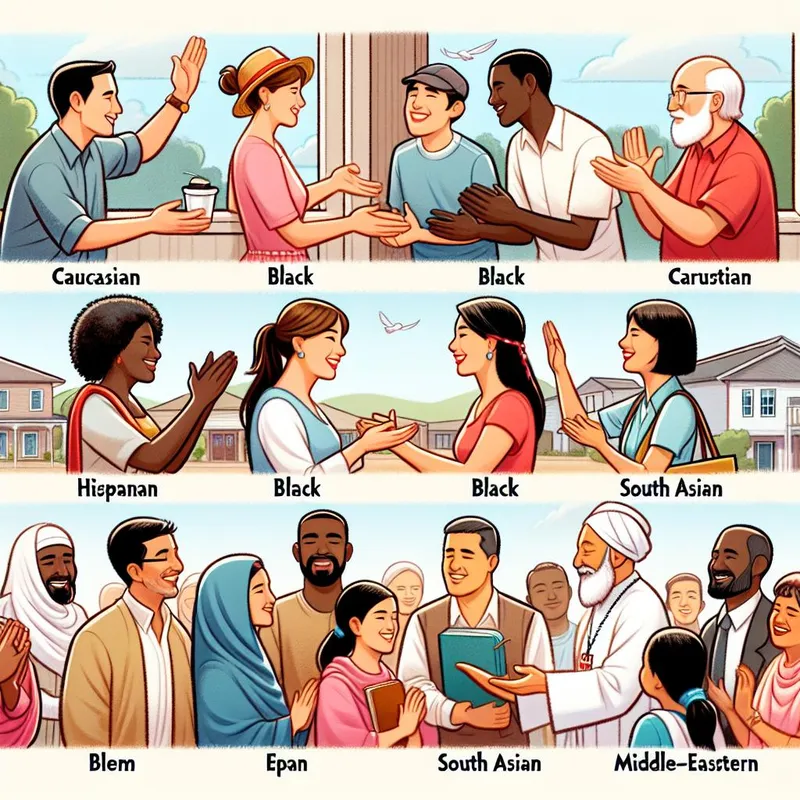
'Unlocking the Divine Connection: Mission and Ethnicity in Christian Faith'
Posted on 24 August 2024
Mission and Ethnicity in Christianity
As Christians, our mission is to spread the gospel and make disciples of all nations. This includes prioritizing the unreached people groups, engaging in home missions within ethnic British communities, and embracing cross-cultural ministry. In this article, we will explore the biblical approach to cross-cultural ministry, discuss the Christian response to mass migration, and consider ethnicity considerations in church planting. Let us delve into these topics from a staunchly conservative, biblical perspective.
1. How should Christians prioritize reaching unreached people groups?
Reaching unreached people groups should be a top priority for Christians, as it aligns with the Great Commission given by Jesus in Matthew 28:19-20. We are called to go and make disciples of all nations, which includes those who have not yet heard the gospel. God's heart is for all people to come to know Him (2 Peter 3:9), and it is our responsibility as His followers to actively engage in missions.
In prioritizing unreached people groups, we should prioritize proximity, need, and strategic opportunities. Proximity refers to focusing on those who are geographically closer to us, as it allows for easier access and cultural understanding. Need refers to targeting areas with limited access to the gospel and where the spiritual darkness is prevalent. Strategic opportunities refer to regions where governments are more open to Christian missions or where there are existing networks and partnerships that can be leveraged for effective outreach.
2. How can Christians engage in home missions within ethnic British communities?
Engaging in home missions within ethnic British communities is essential for the advancement of the gospel within our own nation. As Christians, we are called to love our neighbors as ourselves (Matthew 22:39), which includes reaching out to those within our own communities.
To engage in home missions effectively, we should embrace cultural sensitivity and understanding. This involves learning about the traditions, beliefs, and needs of ethnic British communities. By investing time in building relationships, addressing social and practical needs, and demonstrating Christ's love through our actions, we can create opportunities to share the gospel.
Additionally, partnering with local churches and ministries that are already serving within these communities can be beneficial. They have established relationships and a deeper understanding of the unique challenges and opportunities present. By collaborating with them, we can work together to bring the message of salvation to those who have not yet heard it.
3. What is the biblical approach to cross-cultural ministry?
The biblical approach to cross-cultural ministry requires humility, flexibility, and a willingness to adapt without compromising the truth of the gospel. The Apostle Paul serves as an excellent example of someone who embraced cross-cultural ministry in his missionary journeys.
In 1 Corinthians 9:19-23, Paul states that he became all things to all people in order to win them for Christ. He adapted his approach and behavior depending on the cultural context he found himself in, without compromising the core message of salvation through Jesus Christ alone.
Cross-cultural ministry also involves learning the language and customs of the people we are ministering to. This demonstrates respect for their culture and opens doors for effective communication. It is essential to remember that while cultural adaptation is important, biblical principles must always guide our actions and decisions.
4. How should Christians respond to mass migration from different ethnic backgrounds?
As Christians, our response to mass migration from different ethnic backgrounds should be rooted in love, compassion, and biblical principles. The Bible repeatedly commands us to show hospitality to strangers (Hebrews 13:2), love our neighbors as ourselves (Matthew 22:39), and care for the vulnerable (Leviticus 19:34).
While recognizing the complexities surrounding migration policies and national security concerns, we should strive to extend Christ's love to those who are displaced or seeking refuge. This can be done through practical acts of kindness, such as providing food, shelter, and support to those in need. It is also important to offer emotional and spiritual support, recognizing that many migrants often face trauma and uncertainty.
At the same time, we must uphold the rule of law and respect the sovereignty of nations. Finding a balance between compassion and the need for orderly immigration processes is crucial. Christians should engage in advocating for just policies that protect the dignity and rights of all individuals involved.
5. What factors should be considered regarding ethnicity in church planting?
Ethnicity considerations in church planting involve recognizing the importance of cultural diversity within the body of Christ. The Bible affirms that all believers, regardless of their ethnic background, are part of one body in Christ (Galatians 3:28). In church planting, it is essential to embrace this diversity and create an inclusive environment where people from different ethnic backgrounds feel welcomed and valued.
Church leaders should actively seek to understand the unique cultural expressions and needs of different ethnic groups within their congregations. This may involve incorporating diverse worship styles, providing language-specific ministries, or offering programs that address specific cultural challenges or experiences.
Additionally, intentional efforts should be made to promote unity and foster meaningful relationships across ethnic lines. This can include organizing events that celebrate different cultures, facilitating cross-cultural interactions, and promoting mutual understanding.
Ultimately, the goal is to create a church community that reflects the beautiful diversity of God's creation while maintaining a shared commitment to biblical truth. In conclusion, as Christians, our mission extends beyond our own cultural boundaries. We are called to prioritize reaching unreached people groups, engage in home missions within ethnic British communities, adopt a biblical approach to cross-cultural ministry, respond with love and compassion to mass migration from different ethnic backgrounds, and consider ethnicity in church planting. By staying grounded in Scripture and faithfully following Jesus' example, we can effectively fulfill our mission and bring glory to God through our engagement with people of all ethnicities.
